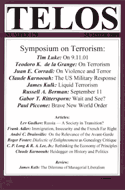Each Tuesday in the TELOSscope blog, we reach back into the archives and highlight an article whose critical insights continue to illuminate our thinking and challenge our assumptions. Today, Andrew Walker looks at Roger Foster’s ” Dialectic of Enlightenment as Genealogy Critique,” from Telos 120 (Summer 2001).
 It is often cited as the founding text of Critical Theory in the Frankfurt School tradition. Even Michel Foucault is said to have claimed that he could have saved himself a lot of time had he read Dialectic of Enlightenment years earlier. The book draws together threads from Weber, Freud, Lukács, and Marx in order to show the authors’ view of modernity as a world of restricted thought and suppressed alternatives. Rather than bringing forth a new age of human emancipation, the rise of Enlightenment reason has led to new forms of domination, it has become its opposite, it has reverted to myth. The book analyzes the all-pervasiveness of commoditizing social relations, the totalizing presence of cultural production, and the domination of the critical faculties of rational thought. Though its importance is widely recognized, Dialectic of Enlightenment has often been dismissed as being pessimistic to the point of anachronistic. It should continue to be read and re-read, however, as there is still a great deal of insight into the one-dimensionalism of dominant social thought within its pages.
It is often cited as the founding text of Critical Theory in the Frankfurt School tradition. Even Michel Foucault is said to have claimed that he could have saved himself a lot of time had he read Dialectic of Enlightenment years earlier. The book draws together threads from Weber, Freud, Lukács, and Marx in order to show the authors’ view of modernity as a world of restricted thought and suppressed alternatives. Rather than bringing forth a new age of human emancipation, the rise of Enlightenment reason has led to new forms of domination, it has become its opposite, it has reverted to myth. The book analyzes the all-pervasiveness of commoditizing social relations, the totalizing presence of cultural production, and the domination of the critical faculties of rational thought. Though its importance is widely recognized, Dialectic of Enlightenment has often been dismissed as being pessimistic to the point of anachronistic. It should continue to be read and re-read, however, as there is still a great deal of insight into the one-dimensionalism of dominant social thought within its pages.
Roger Foster demonstrates the present relevance of this work in his article ” Dialectic of Enlightenment as Genealogy Critique,” from Telos 120 (Summer 2001). Foster defends Dialectic against a number of criticisms by demonstrating that it does not lose out to its own pessimism. Its does not dismiss Enlightenment rationality as such as domination; rather, it is a historically rooted critique that seeks to “trace the suppression of reason’s context transcending force, in order to reveal both its contingency and its entwinement with dominant social interests” (80). It stands as a critique of one aspect Enlightenment rationality, logical positivism, which has become synonymous with rationality itself. Foster continues:
the critique developed in Dialectic of Enlightenment . . . takes the form of a genealogical critique of the positivist Enlightenment because Adorno & Horkheimer see the positivist mentality as the intellectual reflection of the reification pervasive in the social world. (81)
If read in this way, Foster argues, Dialectic of Enlightenment tells a story of the rise to supremacy of only one mode of rationality. The dominance of positivist thinking reduces the space for critical experience and for rational consideration of the social and historic roots of present social structures and systems of knowledge.
Perhaps the most interesting and relevant aspect of Dialectic in Foster’s article is the ways it uses genealogical method to show
the present as an object of critical experience, through the presentation of the dominant structure of rational thinking as founded on a repression of alternative possibilities. (82)
The fear of the unknown, which objectifies itself into the idolatry of gods and demons in mythically based thought systems, is expressed in positivist though as a “totalizing world of pure immanence” in which everything is classifiable and quantifiable (86). Anything that lies outside this “rational” construct is therefore a source of fear, in the Freudian sense. The discourse of colonialism, orientalism, and present Western global dominance casts the other as the unknown, the source of fear. The BBC’s decision to invite the leader of the extreme right British National Party, Nick Griffin, to appear on its flagship current affairs program Question Time juxtaposes “safe,” mainstream politics with its extremist, racist opposite. The unknown, the radical outlier, is portrayed as a source of fear, hatred, and derision. No space is granted to the discussion of a genuine alternative, or to the validity and intellectual coherence within any form of radical politics. The critical experience has been reduced to the choice between the established norm and the fascist, destructive alternative.
What Foster achieves in his article is a valid demonstration of the importance and relevance of Dialectic of Enlightenment. Jürgen Habermas’s claims of “performative contradiction” perhaps miss the mark in Foster’s assessment. They might be better leveled at later postmodernism, where the tendency toward “crypto-normativism” that Habermas highlights, undermines the intellectual argument. Dialectic of Enlightenment should not be cast aside as a historical curiosity, nor should it be perceived only as a problem that Critical Theory has had to “theorize its way out of.” What Foster demonstrates in his article is the intellectual strength and importance of this work; that it should continue to be read, re-read, and learned from.
Read the full version of Roger Foster’s ” Dialectic of Enlightenment as Genealogy Critique” at the TELOS Online website. If you are affiliated with an institution that is an online subscriber to Telos, you have free access to our complete online archive. If not, you can purchase 24-hour access to this and other Telos articles at the low rate of $5/article.








